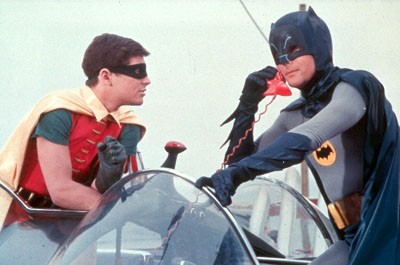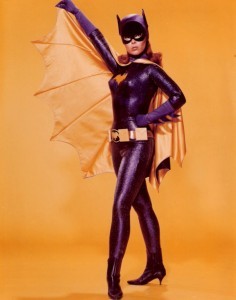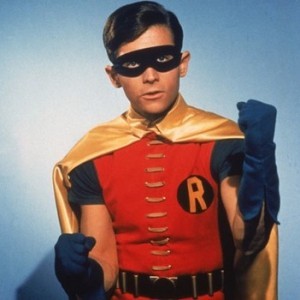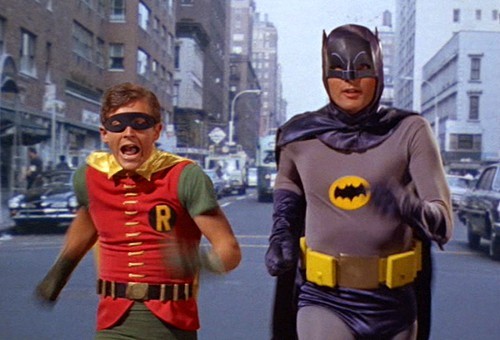
http://www.youtube.com/watch?v=Oso3rrtcs1M
Bless me followers, for I have sinned. It has been two weeks since my last confession. Between actually attending Comic-Con, writing coverage of said event (I swear I have another article somewhere…) and the recovery period that necessarily follows any event of such enormity and optical stimulation, this young sister found herself laying abed crying over the final episodes of Doctor Who series four last weekend, rather than filming a charming rant on a topical subject. But fear not, for I am back in action!
This week I present, for you consideration: “Batman”. Not the big budget blockbuster currently playing in multiplexes nationwide. Not even Tim Burton’s amusing yet dark adaptations currently available for $5 a piece on DVD at any given Walmart (this is where I acquired my copies back in college anyway). No, I am talking about a man who, by rights, ought to be the most famous Batman, simply because he could be seen twice a week on ABC donning the batsuit for the better part of two years: Adam West.

West, the only American to ever be offered the role of iconic British super spy James Bond, starred in the 1966 television adaptation of the popular DC comic. Alongside Burt Ward as Dick Grayson/Robin, he would face and defeat a diabolical Batvillain, be they of comic book origin or an original creation, in a two part episode: part one always ending with a cliffhanger, wherein it looked like our heroes were doomed and part two seeing the inevitable triumph of good over evil. By season three the format had changed, with most stories contained to a single episode and the addition of Yvonne Craig as Barbara Gordon/Batgirl to the crime fighting regime.
Now this adaptation of Batman is often the subject of criticism amongst modern audiences due to its over-the-top, campy presentation. Newsflash naysayers: yes, “Batman” did have dark origins, but all the doom and gloom seen so prominently in Nolan’s films came later. Admittedly, the overly dark tone applied to the comic in the mid-80s and later in Tim Burton’s films was a direct backlash against the campy-ness that the general populace had come to associate with the series due to the 60s TV show. But DC comics was only just returning to doing serious detective stories, and moving away from the super fluffy 50’s plots containing space aliens, when “Batman” producer William Dozier decided to make the TV series a pop art action comedy.
And thank goodness he did! While the series eventually became a little too silly, even for this sister who is generally in favor of silliness, season one struck a perfect balance of believable (okay, “believable” might be too strong an adjective) plot, action and comedy, resulting in the series acquiring a huge fan base and stellar ratings. The show was so popular that many of the major celebrities of their time were all lobbying to guest star as Batvillains. Well established actors, comedians, musicians, television personalities, Broadway stars; anybody was was anybody was lobbying for an appearance – it was the “in” thing to do.

On top of that, the popularity Dozier’s TV show saw sales of Batman comics skyrocket. Right before the series aired in 1966, sales of Batman comics were so bad that D.C. was planning on killing off the character all together.
So, if you’re not a fan of the show, consider this: if it never happened, the darker, more serious, modern Dark Knight adaptations you hold so dear would never have been, because Bruce Wayne would have been laid to his final rest long before the likes of Frank Miller, Tim Burton or Christopher Nolan could have gotten their hands on him.
A final word in defense of the 1966 series and this in regards to Batman’s sidekicks, Robin and Batgirl. They embody a positive portrayal of youth and women respectively. Robin, though often impetuous and youthful, is arguably the smartest character on the show; always the first person to solve The Riddler’s riddles and to anticipate any given Batvillain’s plan. Batgirl, re-introduced as Police Commissioner Gordon’s daughter Barbara in the comics 1967 — specifically so she could also be used in the TV show’s third season to attract more female viewers — was portrayed as Batman’s physical and intellectual equal.
Craig says that still to this day, women tell her about their ongoing idolization of Batgirl, and that thanks to her, they believed they could do anything as well as any man. I know that as a little girl sleeping over at my grandmother’s house watching “Batman” re-runs, Batgirl was definitely the inspiration growing up.
Incidentally, much as I adore this show, it is actually my second favorite adaptation! Number one from my childhood, will always Fox’s critically-acclaimed “Batman: The Animated Series.” Damn straight.
[fbliked]Insert Your “LIKED” Content Here[/fbliked]


I do love me some dry, witty, Batman-related humor 😉 Nicely done, girl. You make listening to movie reviews interesting again.
My brother and I used to fight over the TV because of this show. He wanted to watch it and I wanted to watch “I Love Lucy”. LOL.
ha ha ha! I loved your video, Emma! Pretty jealous that mine come out so shitty compared to that pristine home professionalism! I watched a lot of “Batman” as a kid and sort of damn miss it. I think it followed “Body By Jake” on the Family Channel! I also didn’t know all those 60s celebrities were either on the show or wanted to be on it.
That’s nutty!
“the overly dark tone applied to the comic in the mid 80s and later in Tim Burton’s films was a direct backlash against the campy-ness that the general populace had come to associate with the series due to the 60s TV show.”
Her lack of knowledge on the comic is just breathtaking. The TV series did indeed save the comic from cancellation in 1966 and by 1969 when the series crashed and burned the sales likewise plummeted. During the intervening 3 years the comic adapted the campy tone of the tv series and when it ended it ended BIG. That was when Julius Schwartz, Denny O’Neil, Neal Adams, Bob Brown, Irv Novick, Jim Aparo and others stepped in. and gave the batmobile a hard right turn into serious detective drama. Batman was the moody, serious superhero detective through out all of the 1970’s and well into the 80’s until Miller’s Dark Knight. Starting with that mini-series Miller got a hold of the batmobile’s steering wheel and started the long slow. gradual turn into obsessed psychopath of justice.
She skips right over this period as if the character wet from camp into suspended animation and then into Miller time. 100’s of issues of Detective and Batman totally dismissed and ignored. Honey, you cant get from here to there without passing through those issues.
I certainly didn’t meant to imply that there was no progress to towards the dark and dreary before Burton’s adaptation. Being a child of the 80s, my introduction to Batman naturally came through the the adaptations of that time. There was certainly a huge evolution in the comics and (eventually) in the Burton films and beyond in terms of tone from the time the TV series ended in 68′ to when “Batman” was released in the theatres in 1989 – of course there was! There was 20 years in between.
That being said, I will freely admit that I have not read any of the comics from the 70s- I do come from a family of West Worshippers. 🙂
I love your video. You are very cute and I’m wondering if you’ll take me to Del Taco for my birthday. I’ll be keeping tabs. Don’t worry, I don’t know where you live (I’m assuming the planet Hott).
And, yes, I was a fan of the TV show far before he got “Dark” on us. Although having a Batman wearing a black suit fight the blue-suited Adam West would have been pretty courageous.
Del Taco! This one’s a keeper, Em!
Thx for your post, I really enjoy your blog. Long time lurker, first time commenter, you know the drill. I tried to share this one time before, I don’t think it posted correctly…hopefully it will this time!
I agree. There’s a lot of Bat-info missing, but there’s nothing wrong with exposing your confessions and no reason to be embarassed by this one 🙂